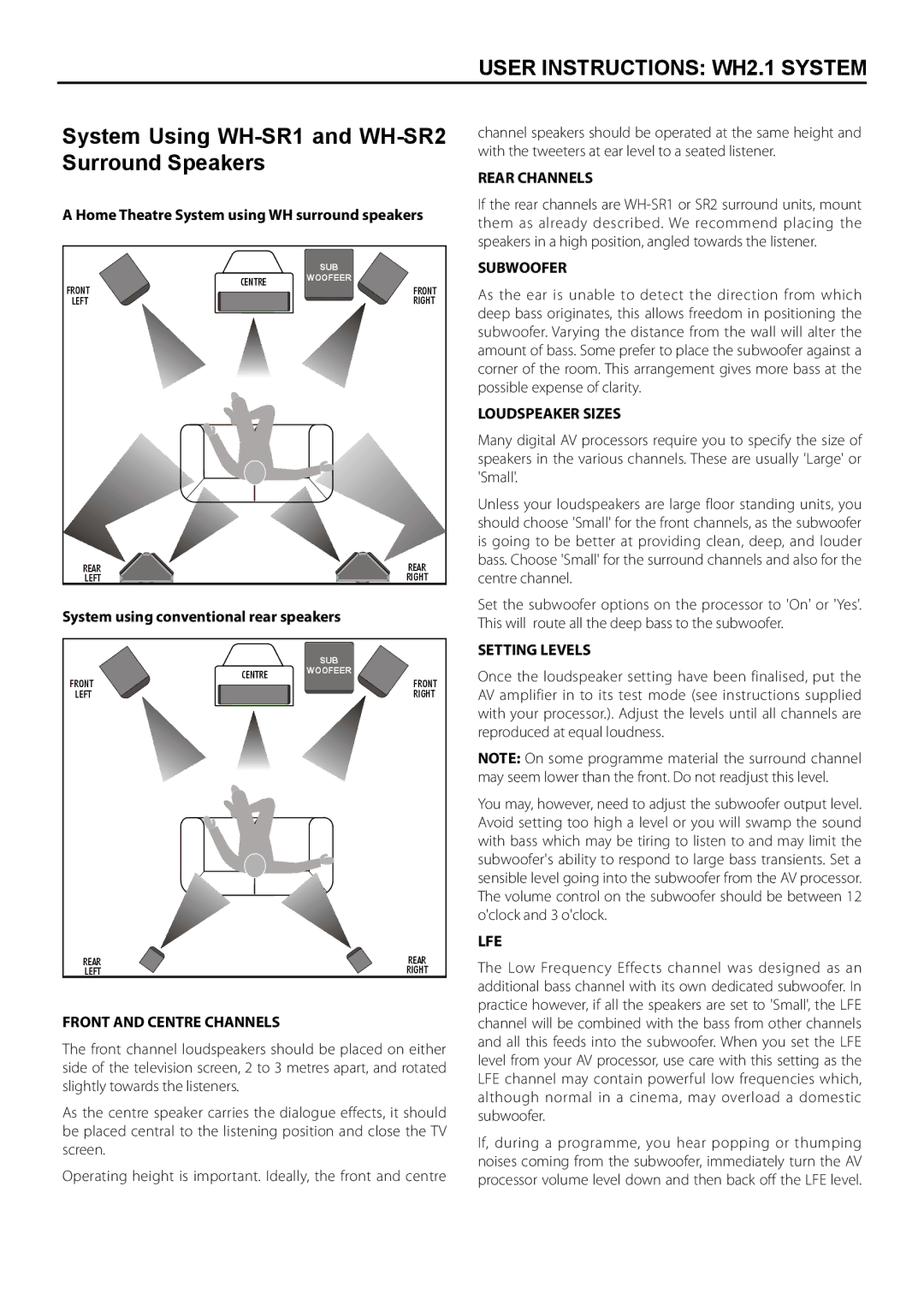
USER INSTRUCTIONS: WH2.1 SYSTEM
System Using WH-SR1 and WH-SR2 Surround Speakers
A Home Theatre System using WH surround speakers
|
| SUB | |
| CENTRE | WOOFEER | |
FRONT | FRONT | ||
| |||
LEFT |
| RIGHT | |
REAR |
| REAR | |
LEFT |
| RIGHT |
System using conventional rear speakers
|
| SUB | |
| CENTRE | WOOFEER | |
FRONT | FRONT | ||
| |||
LEFT |
| RIGHT | |
REAR |
| REAR | |
LEFT |
| RIGHT |
FRONT AND CENTRE CHANNELS
The front channel loudspeakers should be placed on either side of the television screen, 2 to 3 metres apart, and rotated slightly towards the listeners.
As the centre speaker carries the dialogue effects, it should be placed central to the listening position and close the TV screen.
Operating height is important. Ideally, the front and centre
channel speakers should be operated at the same height and with the tweeters at ear level to a seated listener.
REAR CHANNELS
If the rear channels are
SUBWOOFER
As the ear is unable to detect the direction from which deep bass originates, this allows freedom in positioning the subwoofer. Varying the distance from the wall will alter the amount of bass. Some prefer to place the subwoofer against a corner of the room. This arrangement gives more bass at the possible expense of clarity.
LOUDSPEAKER SIZES
Many digital AV processors require you to specify the size of speakers in the various channels. These are usually 'Large' or 'Small'.
Unless your loudspeakers are large floor standing units, you should choose 'Small' for the front channels, as the subwoofer is going to be better at providing clean, deep, and louder bass. Choose 'Small' for the surround channels and also for the centre channel.
Set the subwoofer options on the processor to 'On' or 'Yes'. This will route all the deep bass to the subwoofer.
SETTING LEVELS
Once the loudspeaker setting have been finalised, put the AV amplifier in to its test mode (see instructions supplied with your processor.). Adjust the levels until all channels are reproduced at equal loudness.
NOTE: On some programme material the surround channel may seem lower than the front. Do not readjust this level.
You may, however, need to adjust the subwoofer output level. Avoid setting too high a level or you will swamp the sound with bass which may be tiring to listen to and may limit the subwoofer's ability to respond to large bass transients. Set a sensible level going into the subwoofer from the AV processor. The volume control on the subwoofer should be between 12 o'clock and 3 o'clock.
LFE
The Low Frequency Effects channel was designed as an additional bass channel with its own dedicated subwoofer. In practice however, if all the speakers are set to 'Small', the LFE channel will be combined with the bass from other channels and all this feeds into the subwoofer. When you set the LFE level from your AV processor, use care with this setting as the LFE channel may contain powerful low frequencies which, although normal in a cinema, may overload a domestic subwoofer.
If, during a programme, you hear popping or thumping noises coming from the subwoofer, immediately turn the AV processor volume level down and then back off the LFE level.
